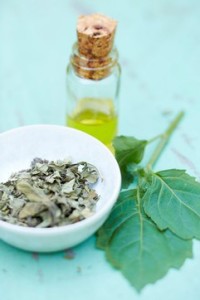Patchouli (Pogostemon cablin (Blanco) Benth; also patchouly or pachouli) is a species of plant from the genus Pogostemon. It is a bushy herb of the mint family, with erect stems, reaching two or three feet (about 0.75 metre) in height and bearing small, pale pink-white flowers. The plant is native to tropical regions of Asia, and is now extensively cultivated in China, Indonesia, India, Malaysia, Mauritius, Taiwan, the Philippines, Thailand, and Vietnam.
Contents
Uses
Perfume
Patchouli is used widely in modern perfumery, by individuals who create their own scents, and in modern scented industrial products such as paper towels, laundry detergents, and air fresheners. Two important components of its essential oil are patchoulol and norpatchoulenol.
Insect repellent
One study suggests that patchouli oil may serve as an all-purpose insect repellent. More specifically, the patchouli plant is claimed to be a potent repellent against the Formosan subterranean termite.
Incense
Patchouli is an important ingredient in East Asian incense. Both patchouli oil and incense underwent a surge in popularity in the 1960s and 1970s in the US and Europe, mainly as a result of the hippie movement of those decades.
Culinary
Patchouli leaves have been used to make an herbal tea. In some cultures, patchouli leaves are eaten as a vegetable.
Benefits
Antidepressant: This oil works great for people suffering from depression. It helps them to get over the feelings of sadness or loss and fills them with new hope. That is why patchouli essential oil is so frequently used in aromatherapy. It uplifts mood, drives away disappointment, and relaxes tension in the majority of people, even if they are being treated for something else. This is due to the impact that inhaling patchouli essential oil has on the hormones and various chemical reactions in the body and mind. By stimulating the release of pleasure hormones like serotonin and dopamine, feelings of anxiety, anger, and sadness simply disappear.
Antiphlogistic: It soothes inflammation, particularly if the inflammation or irritation is a result of fever, and it also provides relief from the fever itself. This means that patchouli essential oil could be useful in treating a wide array of skin conditions, as well as internal inflammation from conditions like arthritis and gout.
Antiseptic: Patchouli essential oil protects wounds and ulcers from developing infections and becoming septic. This is perhaps the most important property of this oil, since small wounds in the skin can lead to much more serious infections, including tetanus, if the wound was inflicted with a rusty, iron object. Patchouli essential oil protects against that possibility as well.
Aphrodisiac: Patchouli Oil is also good for treating sexual problems including impotency, loss of libido, disinterest in sex, erectile dysfunctions, frigidity, and sexual anxiety. It is good for both men and women to put a spark back in the bedroom by stimulating the sexual hormones, estrogen and testosterone, which boosts the sex drive. Patchouli essential oil has been used as an aphrodisiac for hundreds of years.
Astringent: This powerful essential oil stimulates contractions in muscles, nerves and skin. This helps strengthen the hold of gums on the teeth, prevents sagging skin, hair loss, and loosening of muscle tissue. The astringency of patchouli oil also helps stop hemorrhaging by contracting the blood vessels. It can act as an anti-aging substance in this way, since loosening of muscle and skin is commonly associated with getting old.
Cicatrisant: Patchouli essential oil helps speed the healing process of cuts and wounds, and also hastens the fading of scars. It is similarly effective in eliminating marks left by boils, acne, pox, and measles.
Cytophylactic: This property of the Essential Oil of Patchouli promotes growth by stimulating the generation of new bodily cells. This also helps in the production of red blood cells, which can boost energy levels. By increasing the circulation, it also increases the oxygenation of organs and cells throughout the body, increasing their functionality and boosting the overall metabolism of the body. Patchouli essential oil is particularly good at regenerating new skin cells, thus keeping the skin looking healthy, young and vibrant.
Deodorant: The strong sweet, spicy and musky aroma of this essential oil eliminates or masks body odor. However, it should be used in a diluted form as the aroma of Patchouli Oil might be very strong to some people’s olfactory senses. It remains a popular oil to use as a cologne in many cultures and cultural demographics. Some people find the smell wonderful, while others are somewhat irritated by its distinctive aroma.
Diuretic: It increases the frequency of urination as well as the quantity of urine. This helps lose weight, lower blood pressure, increase appetite, lower cholesterol and remove of toxins from the body. Urination removes excess water, unnecessary salts, and uric acid, which reduces your chances of developing gallbladder stones and kidney stones, as well as forming conditions like gout.
Febrifuge: Patchouli essential oil reduces body temperature in cases of fever by fighting the infections that cause the fever. As an antiphlogistic, it relieves the inflammation caused by fever, which simultaneously helps to bring down the fever, since fevers can be reduced to some extent if the pain and inflammation associated with fever are eliminated.
Fungicide: Patchouli Essential Oil has been found to be quite effective at inhibiting fungal growths and infections, thereby providing protection from some notorious infections like Athlete’s Foot. Fungal infections can be quite serious, especially when they attack the respiratory system through inhalation. Patchouli essential oil becomes very valuable at that point to keep your body fully protected.
Cautions
The long lasting aroma of patchouli essential oil, though sweet, may be too strong and almost unpleasant to some people. Be cautious about using too much or smelling too strongly of it, as the aroma can be irritating to certain people.
Interactions
None are recorded.
Other names
patchouly or pachouli
Reference
Source: Wikipedia, https://en.wikipedia.org/wiki/Patchouli
OrganicFacts, https://www.organicfacts.net/health-benefits/essential-oils/health-benefits-of-patchouli-essential-oil.html

